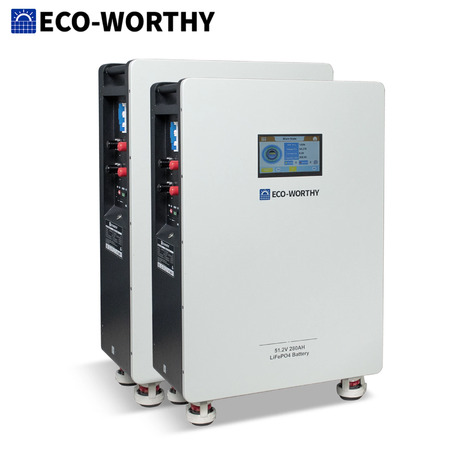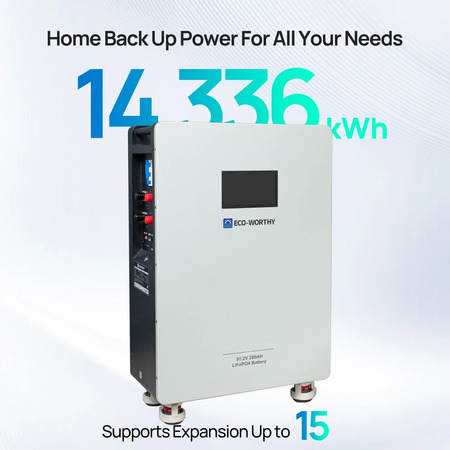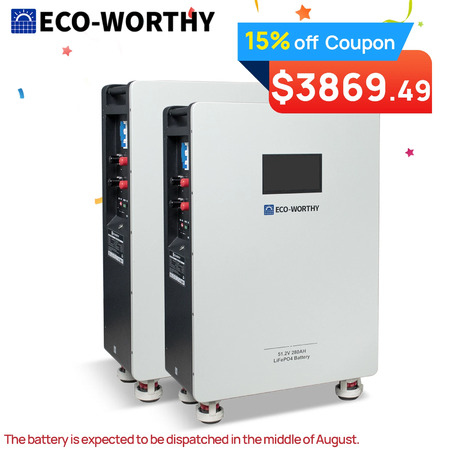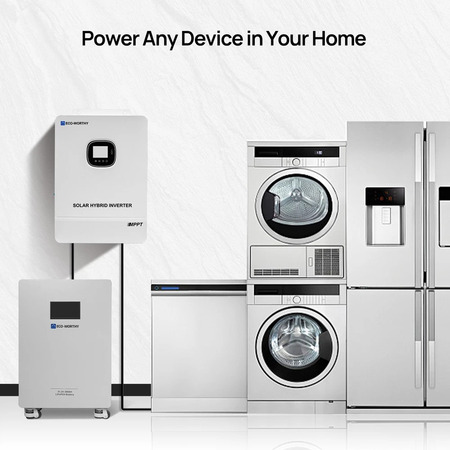eco-worthy-us via eBay has
2-Pack ECO-WORTHY 14kWh 48V 280AH LiFePO4 Solar Battery Vertical Standing Backup on sale for $4219.49 - $350 with coupon code
FIFTEENFORYOU at checkout =
$3869.49.
Shipping is free.
Thanks to staff member
Skillful_Pickle for sharing this deal.
Note: This is for a Battery System only and will require connectors and a compatible power system (such as an inverter) to function.
About this Item:
- Battery Capacity: 280Ah
- Battery Power: 14336Wh
- Rated Voltage: 51.2V
- Voltage Range: 40~58.4V
- Maximum Charge/ Discharge Current: 200A
- Charge Temperature Range: 0-55℃
- Discharge Temperature Range:﹣20-55℃
- Maximum Charge Voltage: 58.4V
- Screw size: M8
- Battery Size: 23.62x10.31x30.79in
- Battery Weight: 297.6lb/135kg
- Max. parallel units: 15
- Connectors: RS232 / CAN / RS485




Leave a Comment
Top Comments
I buy shit on AliExpress all the time but that's not a screaming deal that's worth some risk.
35 Comments
Sign up for a Slickdeals account to remove this ad.
I recently looked at buying a house that had rooftop solar installed, but they didn't appear to have any kind of battery solution. I did a bit of quick research into batteries, as I was thinking they might pay for themselves pretty quickly if I charged from solar during the day and/or from the grid at night during off-peak times, but it seemed like the ROI was higher than I expected, looking at 8-12 years using back-of-napkin math. Was I missing something here? I know it's pretty variable depending on your situation, but what is the expected ROI on a battery solution like this for a typical grid-connected home with rooftop solar?
Our community has rated this post as helpful. If you agree, why not thank burgerbob
I recently looked at buying a house that had rooftop solar installed, but they didn't appear to have any kind of battery solution. I did a bit of quick research into batteries, as I was thinking they might pay for themselves pretty quickly if I charged from solar during the day and/or from the grid at night during off-peak times, but it seemed like the ROI was higher than I expected, looking at 8-12 years using back-of-napkin math. Was I missing something here? I know it's pretty variable depending on your situation, but what is the expected ROI on a battery solution like this for a typical grid-connected home with rooftop solar?
Our community has rated this post as helpful. If you agree, why not thank Tarkov
I recently looked at buying a house that had rooftop solar installed, but they didn't appear to have any kind of battery solution. I did a bit of quick research into batteries, as I was thinking they might pay for themselves pretty quickly if I charged from solar during the day and/or from the grid at night during off-peak times, but it seemed like the ROI was higher than I expected, looking at 8-12 years using back-of-napkin math. Was I missing something here? I know it's pretty variable depending on your situation, but what is the expected ROI on a battery solution like this for a typical grid-connected home with rooftop solar?
I've been thinking about getting a backup battery but it will literally only be useful during power outages (specifically hurricanes) so it's not really worth the investment compared to the generator we already have.
The ROI depends on the cost of energy in the location you are. I pay .11/kwh, some pay less, many pay more. If you can generate what you use in a day, including storing your nighttime use in enough batteries to get you through the night that's a straight math problem. I personally look at the batteries as a backup power solution and not a cost savings solution. I have enough batteries to keep my house running for 24 hours, which is equivalent to about 8 of these sized batteries in this deal. The solar panels are the cost savings driver as that's where the "free" power comes from.
These batteries can qualify for the 30% tax credit that's going to end this year, but they need to be charged by solar and need to be put in service this year to qualify, so that helps with the math.
Sign up for a Slickdeals account to remove this ad.
$580.00 | Super Value 30kwh 46kwh 50kwh LiFePo4 Batteries Complete kit Energy Storage 48V 51.2V 900Ah 600Ah 1000ah Power Bank BMS
https://a.aliexpress.co
$580 for 5kwh plus $1,000 shipping. A 30kwh unit, close to the total capacity here, is $2,280 plus $1k shipping. $3,467 is the total at checkout. Not much cheaper and you'll have basically no recourse if shit goes wrong.
I buy shit on AliExpress all the time but that's not a screaming deal that's worth some risk.
Pace bms.. it says so in the description of the listing
The ROI depends on the cost of energy in the location you are. I pay .11/kwh, some pay less, many pay more. If you can generate what you use in a day, including storing your nighttime use in enough batteries to get you through the night that's a straight math problem. I personally look at the batteries as a backup power solution and not a cost savings solution. I have enough batteries to keep my house running for 24 hours, which is equivalent to about 8 of these sized batteries in this deal. The solar panels are the cost savings driver as that's where the "free" power comes from.
These batteries can qualify for the 30% tax credit that's going to end this year, but they need to be charged by solar and need to be put in service this year to qualify, so that helps with the math.
The ROI depends on the cost of energy in the location you are. I pay .11/kwh, some pay less, many pay more. If you can generate what you use in a day, including storing your nighttime use in enough batteries to get you through the night that's a straight math problem. I personally look at the batteries as a backup power solution and not a cost savings solution. I have enough batteries to keep my house running for 24 hours, which is equivalent to about 8 of these sized batteries in this deal. The solar panels are the cost savings driver as that's where the "free" power comes from.
These batteries can qualify for the 30% tax credit that's going to end this year, but they need to be charged by solar and need to be put in service this year to qualify, so that helps with the math.
Fyi the battery doesn't need to be charged by solar to qualify for the 30 percent tax credit. It just need to be 3kwh or more in total and hooked up to your house whatever that means. It does end this year.
https://www.youtube.com/watch?v=7...ola
Sign up for a Slickdeals account to remove this ad.
Leave a Comment